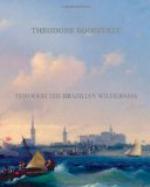We stayed at the ranch until a couple of days before Christmas. Hitherto the weather had been lovely. The night before we left there was a torrential tropic downpour. It was not unexpected, for we had been told that the rainy season was overdue. The following forenoon the baggage started, in a couple of two-wheeled ox-carts, for the landing where the steamboat awaited us. Each cart was drawn by eight oxen. The huge wheels were over seven feet high. Early in the afternoon we followed on horseback, and overtook the carts as darkness fell, just before we reached the landing on the river’s bank. The last few miles, after the final reaches of higher, tree-clad ground had been passed, were across a level plain of low ground on which the water stood, sometimes only up to the ankles of a man on foot, sometimes as high as his waist. Directly in front of us, many leagues distant, rose the bold mountains that lie west of Corumba. Behind them the sun was setting and kindled the overcast heavens with lurid splendor. Then the last rose tints faded from the sky; the horses plodded wearily through the water; on every side stretched the marsh, vast, lonely, desolate in the gray of the half-light. We overtook the ox-carts. The cattle strained in the yokes; the drivers wading alongside cracked their whips and uttered strange cries; the carts rocked and swayed as the huge wheels churned through the mud and water. As the last light faded we reached the small patches of dry land at the landing, where the flat-bottomed side-wheel steamboat was moored to the bank. The tired horses and oxen were turned loose to graze. Water stood in the corrals, but the open shed was on dry ground. Under it the half-clad, wild-looking ox-drivers and horse-herders slung their hammocks; and close by they lit a fire and roasted, or scorched, slabs and legs of mutton, spitted on sticks and propped above the smouldering flame.
Next morning, with real regret, we waved good-by to our dusky attendants, as they stood on the bank, grouped around a little fire, beside the big, empty ox-carts. A dozen miles down-stream a rowboat fitted for a sprit-sail put off from the bank. The owner, a countryman from a small ranch, asked for a tow to Corumba, which we gave. He had with him in the boat his comely brown wife—who was smoking a very large cigar—their two children, a young man, and a couple of trunks and various other belongings. On Christmas eve we reached Corumba, and rejoined the other members of the expedition.




